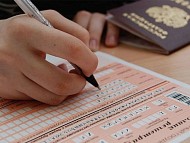News

As is known, the EGE on the Russian language in the academic year 2014-1015 has undergone significant changes. Most of the changes have affected the structure of the exam is.
Vo-pervyh, lost the traditional division of tasks to test tasks Part A (specify one correct answer from four data), jobs with independent choice of the response in a single job, and the increased complexity of the C. This year, all the tasks the exam is divided into two parts and go under the serial numbers from 1 to 25. Tasks part 1 (1-24) correspond to the tasks of the examination tests in previous years, and the task 25, respectively, is an essay-argument of the S.
What does this mean? First of all that the task became a little more complicated. Previously, the bulk of jobs accounted for part of the test, where the student had four possible answers to choose from, only one of which was correct and, therefore, had a chance to guess the correct version, or calculate it in a logical way. Now the examination test job offers, to whom it was given no less than five answer choices, and right can be several of them. This means that the answer "at random" in this test is virtually impossible.
There is another type of job and - requiring to find among all the options one wrong and write it in the examination form in revised form or write down the word with the insertion of letters. Of course, for the graduate, who is well-versed in the proper array for examination of the rules of the Russian language, sees and knows how to correct speech errors or errors associated with use paronyms, the complexity of these tasks are not. But frankly for "weak" students of these tasks are very difficult: even orient in which of the options is wrong, they are unlikely to pick up and record the correct version
.
Volume verifiable rules and so remained virtually unchanged: in particular, the added work with dictionary entries and a detailed analysis of grammatical errors, but disappeared check understanding of such complex topics as types of subordination of adventitious or means of communication of words in the phrase
.
We should also mention another innovation - the final piece for 11 classes, which graduates will be writing on 3 December. Conducted as a set-off, it will become a kind of indicator of the student prepare for the exam itself. The writing is in many respects similar to that which students write on the exam on the Russian language, but does not as a rigid structure. How much justified the introduction of this new form of examination - Time will tell.
и получите материалы по развитию интеллектуальных и творческих способностей ребенка!





